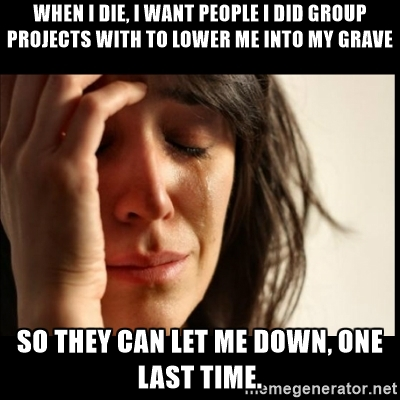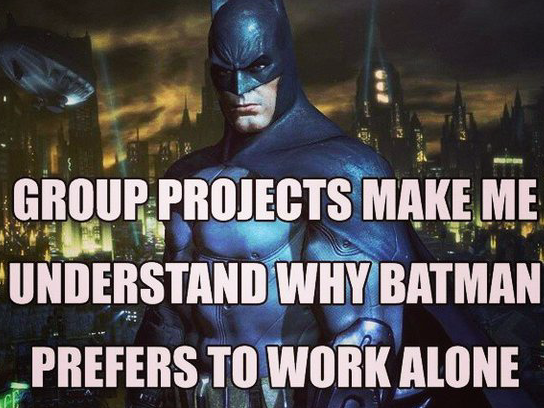I’m an introvert, a lone wolf, and never gravitated toward team sports. When I drive to work, go on my morning run, or attack weeds in the garden, my brain is its most productive. I like to be a creative problem-solver, dig into research, and test out new strategies to examine their potential.
I understand those sayings about “if you want to go fast, go alone; if you want to go far, go together.” Erroneously attributed as an old African proverb, this saying has become the mantra of pro-collaboration folks. Countering the “to go far, go together” meme…on the other hand is this:

Or this…

And I loathe collaboration as it has been formally asked of me in public education.
This is what it has looked like: A team of teachers is grouped together for reasons that typically do carry a surface logic, such as “you all teach freshman English.” We are given a time, place, and task. I appreciate the time. I appreciate the place. The task is where things fall apart for me.
More often than not, the task is a task that I and every other professional in the room can, and often already have, accomplished on our own for our own practice and context but are being asked to recreate for the sake of “collaboration.” Worse, the tasks often represent work that has little to no pertinence to our students or our contexts…or tasks that we engage in out of compliance with protocol. Rare has it been that I’ve walked out of such contrived collaboration with the sense that I or those I serve are better off for me having spent that time.
I do want to make clear: I am not opposed to authentic collaboration. I have learned more from my colleagues about content and practice than I have learned in any course, book, or video. Here’s the problem: My best learning that resulted from actual collaboration didn’t fit the preferred systemic definition collaboration.
As I learn more about cognitive coaching, mentorship, and learning-focused conversations, I see parallels that can help systems rethink the meaning of “collaboration.” From Mentoring Matters by Linda Lipton and Bruce Wellman, I learned about “shifting stances” as a mentor. The authors articulate three stances (coaching, collaborating, and consulting) for how a mentor works with a new colleague. I’d like us to reframe “how we collaborate” with these interaction modes as guides.
Collaboration as Coaching: When a team comes together, a powerful mode of collaboration is mutual peer-coaching. This kind of collaboration is need-based: A teammate shares a need, and instead of going around the table and giving answers, those at the table pose effective coaching questions. The belief is that the person presenting the need is capable of uncovering the solution, and the team collaborates to facilitate the presenting person’s thinking and planning.
Collaboration as Collaboration: This might look redundant, but Lipton and Wellman’s definition of collaboration is different than task-oriented teamwork as it often manifests. To work, collaboration as collaboration is need-based: A teammate shares a need, and a colleague steps forward to express that need as well. Then, together, these teammates both brainstorm, both design, both implement, and both reflect. Both participants have an investment in the outcome. The risk is there for both, the learning is there for both, and the doing belongs to both.
Collaboration as Consultation: This stance, consultation, might not at first appear to be collaboration. This kind of collaboration is, again, need-based (notice a trend?), though in this version, a teacher shares a need, and then those at the table share strategies, advice, ideas, and resources.
Task-oriented collaboration in so many situations is painfully inefficient. Collaboration based on a self-identified need is a different story. If a team feels task-oriented, the team should divide and conquer: delegate, do, report back. Authentic collaboration that changes practice–and thus impacts student learning–isn’t about accomplishing a task; it is about utilizing a team to meet a team-member’s need.
So what needs to change? Perhaps what we expect collaboration to “produce” is part of it. Many models of collaboration seem to involve producing data, reports, assessments, or other tangible outputs. Truly profitable collaboration results in less tangible outcomes, producing changes in classroom practice rather than changes in documents that merely prove we “collaborated.” That is the purpose of coaching and mentorship. I am confident that if we reframe collaboration with the purpose of supporting shifts in practice, and to worry less about the products, more educators will find value in the collaborative structures in our schools.
